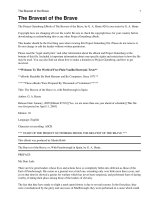By Right of Conquest Or, With Cortez in Mexico ppt
Bạn đang xem bản rút gọn của tài liệu. Xem và tải ngay bản đầy đủ của tài liệu tại đây (767.56 KB, 246 trang )
Chapter 1
Chapter 2
Chapter 3
Chapter 4
Chapter 5
Chapter 6
Chapter 7
Chapter 8
Chapter 9
Chapter 10
Chapter 11
Chapter 12
Chapter 13
Chapter 14
Chapter 15
Chapter 16
Chapter 17
Chapter 18
Chapter 19
Chapter 20
Chapter 21
Chapter 22
Chapter 1
Chapter 2
Chapter 3
Chapter 4
Chapter 5
Chapter 6
Chapter 7
Chapter 8
1
Chapter 9
Chapter 10
Chapter 11
Chapter 12
Chapter 13
Chapter 14
Chapter 15
Chapter 16
Chapter 17
Chapter 18
Chapter 19
Chapter 20
Chapter 21
Chapter 22
By Right of Conquest, by G. A. Henty
The Project Gutenberg EBook of By Right of Conquest, by G. A. Henty This eBook is for the use of anyone
anywhere at no cost and with almost no restrictions whatsoever. You may copy it, give it away or re-use it
under the terms of the Project Gutenberg License included with this eBook or online at www.gutenberg.org
Title: By Right of Conquest Or, With Cortez in Mexico
Author: G. A. Henty
Release Date: September 28, 2006 [EBook #19398]
Language: English
Character set encoding: ASCII
*** START OF THIS PROJECT GUTENBERG EBOOK BY RIGHT OF CONQUEST ***
Produced by Martin Robb
By Right of Conquest: Or, With Cortez in Mexico by G. A. Henty.
Contents
Preface.
By Right of Conquest, by G. A. Henty 2
Chapter 1
: A Startling Proposal.
Chapter 1 3
Chapter 2
: Bound To Unknown Parts.
Chapter 2 4
Chapter 3
: The Voyage.
Chapter 3 5
Chapter 4
: Among The Islands.
Chapter 4 6
Chapter 5
: Shipwrecked.
Chapter 5 7
Chapter 6
: Anahuac.
Chapter 6 8
Chapter 7
: A Wonderful Country.
Chapter 7 9
Chapter 8
: At Tezcuco.
Chapter 8 10
Chapter 9
: Life In A Palace.
Chapter 9 11
Chapter 10
: News From The Coast.
Chapter 10 12
Chapter 11
: Cortez.
Chapter 11 13
Chapter 12
: The Fugitives.
Chapter 12 14
Chapter 13
: The Massacre Of Cholula.
Chapter 13 15
Chapter 14
: In Mexico.
Chapter 14 16
Chapter 15
: Again At Tezcuco.
Chapter 15 17
Chapter 16
: A Treasure Room.
Chapter 16 18
Chapter 17
: The Insurrection.
Chapter 17 19
Chapter 18
: The Rising In Mexico.
Chapter 18 20
Chapter 19
: The Passage Of The Causeway.
Chapter 19 21
Chapter 20
: At Tlascala.
Chapter 20 22
Chapter 21
: A Victim For The Gods.
Chapter 21 23
Chapter 22
: Home.
Preface.
The conquest of Mexico, an extensive empire with a numerous and warlike population, by a mere handful of
Spaniards, is one of the romances of history. Indeed, a writer of fiction would scarcely have dared to invent so
improbable a story. Even the bravery of the Spaniards, and the advantage of superior arms would not have
sufficed to give them the victory, had it not been that Mexico was ripe for disruption. The Aztecs, instead of
conciliating by wise and gentle government the peoples they had conquered, treated them with such despotic
harshness that they were ready to ally themselves with the invaders, and to join with them heartily against the
central power; so that instead of battling against an empire single-handed, the Spaniards had really only to war
with a great city, and were assisted by a vast army of auxiliaries.
Fortunately, the details of the extraordinary expedition of Cortez were fully related by contemporary writers,
several of whom were eyewitnesses of the scenes they described. It was not necessary for me, however, to
revert to these; as Prescott, in his admirable work on the conquest of Mexico, has given a summary of them;
and has drawn a most vivid picture of the events of the campaign. The book far surpasses in interest any
volume of fiction, and I should strongly recommend my readers to take the first opportunity that occurs of
perusing the whole story, of which I have only been able to touch upon the principal events.
While history is silent as to the voyage of the Swan, it is recorded by the Spaniards that an English ship did, in
1517 or 1518, appear off the port of San Domingo, and was fired at by them, and chased from the islands; but
it was not until some twenty or thirty years later that the English buccaneers openly sailed to challenge the
supremacy of the Spaniards among the Western Islands, and to dispute their pretensions to exclude all other
flags but their own from those waters. It may, however, be well believed that the ship spoken of was not the
only English craft that entered the Spanish main; and that the adventurous traders of the West country, more
than once, dispatched ships to carry on an illicit trade there. Such enterprises would necessarily be conducted
with great secrecy, until the relations between Spain and England changed, and religious differences broke up
the alliance that existed between them during the early days of Henry the 8th.
G. A. Henty.
Chapter 22 24
Chapter 1
: A Startling Proposal.
On March 3rd, 1516, the trading vessel the Swan dropped anchor at Plymouth. She would in our days be
considered a tiny craft indeed, but she was then looked upon as a large vessel, and one of which her owner,
Master Diggory Beggs, had good reason to be proud. She was only of some eighty tons burden, but there were
few ships that sailed out from Plymouth of much larger size; and Plymouth was even then rising into
importance as a seaport, having flourished mightily since the downfall of its once successful rival Fowey.
Large ships were not needed in those days, for the only cargoes sent across the sea were costly and precious
goods, which occupied but small space. The cloths of the Flemings, the silks and satins of Italy, the produce
of the East, which passed first through the hands of the Venetian and Genoese merchants, and the wines of
France and Spain were the chief articles of commerce. Thus the freight for a vessel of eighty tons was a heavy
venture, and none but merchants of wealth and position would think of employing larger ships. In this respect
the Spaniards and the Italian Republics were far ahead of us, and the commerce of England was a small thing,
indeed, in comparison with that of Flanders.
In Plymouth, however, the Swan was regarded as a goodly ship; and Master Diggory Beggs was heartily
congratulated, by his acquaintances, when the news came that the Swan was sailing up the Sound, having
safely returned from a voyage to Genoa.
As soon as the anchor was dropped and the sails were furled, the captain, Reuben Hawkshaw, a cousin of
Master Beggs, took his place in the boat, accompanied by his son Roger, a lad of sixteen, and was rowed by
two sailors to the landing place. They were delayed for a few minutes there by the number of Reuben's
acquaintances, who thronged round to shake him by the hand; but as soon as he had freed himself of these, he
strode up the narrow street from the quays to the house of Master Diggory.
Reuben Hawkshaw was a tall, powerfully built man, weatherbeaten and tanned from his many comings and
goings upon the sea; with a voice that could be heard in the loudest storm, and a fierce look but, as his men
knew, gentle and kind at heart, though very daring; and having, as it seemed, no fear of danger either from
man or tempest.
Roger was large boned and loosely jointed, and was likely some day to fill out into as big a man as his father,
who stood over six-feet-two without his shoes.
Reuben was wont to complain that he, himself, was too big for shipboard.
"If a crew were men wholly of my size," he would say, "a ship would be able to carry but a scant crew; for, lie
they as close as they would, there would not be room for a full complement below."
For indeed, in those days space was precious, and on board a ship men were packed well-nigh as close as they
could lie; having small thought of comfort, and being well content if there was room to turn, without angering
those lying next on either side.
The merchant, who was so stout and portly that he offered a strong contrast to his cousin, rose from his desk
as the latter entered.
"I am glad, indeed, to see you back, Cousin Reuben; and trust that all has fared well with you."
"Indifferent well, Cousin Diggory. We have a good stock of Italian goods on board; but as, of course, these
took up but a small portion of her hold, I put into Cadiz on my way back. There I filled up with three-score
barrels of Spanish wine, which will, I warrant me, return good profit on the price I paid for them."
Chapter 1 25









